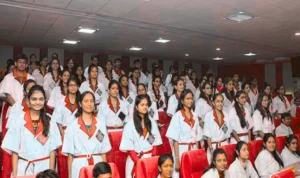In the heart of Jamnagar, Gujarat, stands an institution that bridges the wisdom of the ancient world with the science of the modern age — Gujarat Ayurved University (GAU). Established in 1967, this prestigious public university has earned its reputation as one of the foremost centers of Ayurvedic education and research in the world.
From its inception, GAU has worked tirelessly to promote the principles of Ayurveda — India’s 5,000-year-old holistic medical system. It doesn’t merely teach medicine; it teaches a way of life rooted in harmony between mind, body, and nature. Over the decades, it has attracted students, scholars, and healers from across the globe who come to learn, research, and practice Ayurveda in its purest form.
The university’s history, courses, admission process, ranking, facilities, and its growing global impact. Let’s step into the world of Gujarat Ayurved University — where ancient healing meets modern innovation.
Historical Background of Gujarat Ayurved University
The story of Gujarat Ayurved University begins with India’s post-independence vision to preserve its traditional knowledge systems. Ayurveda had long been practiced across the Indian subcontinent, but there was a need for formal, research-driven education to sustain it in the modern world.
In 1967, under the guidance of the Government of Gujarat and the Ministry of Health, GAU was established in Jamnagar — a city historically known for its deep Ayurvedic roots. The university was created by merging several local Ayurvedic colleges, including the Shri Gulabkunverba Ayurved Mahavidyalaya, one of the oldest institutions of its kind (founded in 1946).
GAU quickly gained recognition for its commitment to both traditional philosophy and scientific validation. In 1978, it became a World Health Organization (WHO) Collaborating Centre for Traditional Medicine — an honor that elevated it onto the global stage. Since then, thousands of international students from over 30 countries have studied Ayurveda here, spreading this ancient science worldwide.
Vision, Mission & Objectives
The vision of Gujarat Ayurved University is simple yet profound — to promote Ayurveda as a scientific and holistic healthcare system for global well-being.
Its mission revolves around three core objectives:
- Education: Providing world-class Ayurvedic learning through structured programs and experiential knowledge.
- Research: Conducting scientific research to validate traditional therapies and herbal medicines.
- Healthcare: Offering authentic Ayurvedic treatments and training through its teaching hospitals and wellness centers.
The university aims to integrate Ayurveda with modern medical research, fostering innovation while preserving its traditional roots.
Campus Overview and Infrastructure
Spread over hundreds of acres in Jamnagar, the GAU campus is a serene environment that perfectly complements the philosophy of Ayurveda. Its tranquil gardens, herbal parks, and traditional architecture create an atmosphere conducive to learning and healing.
Key facilities include:
- A 200-bed Ayurvedic hospital for clinical training.
- A vast herbal garden with over 2,500 species of medicinal plants.
- Modern laboratories equipped for pharmaceutical and biological research.
- A central library that houses ancient Ayurvedic manuscripts, research papers, and digital archives.
- Separate hostels for Indian and international students with all amenities.
- The International Center for Ayurvedic Studies (ICAS) — dedicated to global scholars.
The campus also includes yoga centers, meditation halls, and specialized Panchakarma units — embodying the true spirit of holistic learning.
Quick Facts
| Aspect | Information |
| University Name | Gujarat Ayurved University |
| Established Year | 1967 |
| Location | Jamnagar, Gujarat, India |
| Type | Public University |
| Approved By | UGC, Ministry of AYUSH |
| Affiliation | WHO Collaborating Centre |
| Courses Offered | BAMS, MD, MS, Ph.D., Diplomas |
| Focus Area | Ayurveda, Yoga, Naturopathy |
| Official Website | www.ayurveduniversity.edu.in |
Constituent Institutions of Gujarat Ayurved University

Gujarat Ayurved University is a hub of several specialized institutions that work in synergy to cover every dimension of Ayurveda — from education to pharmaceutical production.
Institute for Post Graduate Teaching & Research in Ayurveda
This is GAU’s flagship institute for postgraduate and Ph.D. programs. It focuses on advanced research in Ayurveda and clinical practice. Students can specialize in over 14 disciplines like Kayachikitsa (General Medicine), Shalya Tantra (Surgery), and Dravyaguna (Herbal Science).
Shri Gulabkunverba Ayurved Mahavidyalaya
Established in 1946, it is India’s oldest Ayurvedic college, offering undergraduate (BAMS) education. It maintains high academic standards and extensive hospital-based training.
Indian Institute of Ayurvedic Pharmaceutical Sciences (IIAPS)
Dedicated to Ayurvedic pharmacy, IIAPS trains students in the manufacturing and formulation of Ayurvedic medicines, ensuring safety, quality, and efficacy.
International Center for Ayurvedic Studies (ICAS)
A unique global platform that welcomes students from across the world to learn Ayurveda. It conducts special diploma and certificate courses tailored for foreign nationals.
Courses Offered at Gujarat Ayurved University
GAU offers a wide range of academic programs designed to meet the needs of both Indian and international students.
Undergraduate Programs
- BAMS (Bachelor of Ayurvedic Medicine and Surgery): A 5½-year program, including a one-year internship. Students study anatomy, physiology, pharmacology, and classical Ayurvedic texts like Charaka Samhita and Sushruta Samhita.
Postgraduate Programs (MD/MS Ayurveda)
These are three-year courses after BAMS in various specialties such as:
- Kayachikitsa (Internal Medicine)
- Panchakarma (Detoxification & Therapy)
- Rasashastra (Ayurvedic Pharmaceutics)
- Dravyaguna (Herbal Medicine)
- Shalya Tantra (Surgery)
- Shalakya Tantra (ENT & Ophthalmology)
Doctoral Programs (Ph.D.)
Advanced research-based degrees focusing on Ayurvedic drug formulation, herbal pharmacology, and integrative medicine.
Diploma & Certificate Courses
Short-term skill-based courses include:
- Panchakarma Technician Course
- Yoga & Naturopathy
- Ayurvedic Dietetics & Nutrition
- Pharmacy and Rasashastra
Each program balances theoretical learning with clinical and practical exposure — keeping true to Ayurveda’s experiential essence.
Admission Process & Eligibility
Admission at Gujarat Ayurved University is merit-based and follows the rules of the Ministry of AYUSH, Government of India.
For BAMS (Undergraduate Program):
- Admission through NEET-UG scores.
- Counseling is conducted by the AYUSH Admission Central Counseling Committee (AACCC).
- Eligibility: 10+2 with Physics, Chemistry, and Biology with a minimum of 50%.
For MD/MS (Postgraduate Program):
- Based on AIAPGET (All India AYUSH Postgraduate Entrance Test) scores.
- Candidates must hold a BAMS degree from a recognized university.
For Ph.D. Programs:
- University-level entrance test followed by an interview.
- Research proposal and academic record evaluated by a panel.
For International Students:
- Admission handled by the International Center for Ayurvedic Studies (ICAS).
- English proficiency required.
- Can apply online or via Indian embassies.
Documents Required:
- NEET/AIAPGET scorecard
- Academic mark sheets (10th, 12th, graduation)
- Transfer/migration certificate
- Passport and visa (for foreign students)
- Medical fitness certificate
Fee Structure and Scholarships
The fee structure varies depending on the course and nationality of the student.
Approximate Fee Range:
- BAMS: ₹1,00,000 – ₹1,50,000 per year
- MD/MS: ₹1,50,000 – ₹2,00,000 per year
- Ph.D.: ₹1,20,000 annually
Scholarships:
- Government of India AYUSH scholarships
- State-level merit scholarships
- Fellowships for Ph.D. research
- Financial aid for international students under ICCR and WHO programs
Global Collaborations and WHO Recognition

Gujarat Ayurved University holds a special place on the international map as a WHO Collaborating Centre for Traditional Medicine since 1978.
It collaborates with renowned institutions such as:
- Tokyo University of Pharmacy and Life Sciences (Japan)
- University of Cologne (Germany)
- National Institute of Health Sciences (Sri Lanka)
- National Center for Natural Products Research (USA)
The university regularly conducts international conferences, workshops, and online training programs to promote global awareness about Ayurveda.
Research, Innovation, and Herbal Development
Research is the backbone of Gujarat Ayurved University. Its laboratories and research centers are equipped with advanced instruments for analyzing medicinal plants, formulations, and their bioactive compounds.
Major Research Areas Include:
- Standardization of Ayurvedic Drugs
- Clinical Research on Chronic Diseases (like arthritis, diabetes, and asthma)
- Phytochemical Analysis and Plant Genomics
- Integration of Ayurveda with Modern Diagnostics
- Panchakarma Therapy Studies
The Ayurvedic Pharmaceutical Lab produces standardized medicines used in hospitals and distributed for clinical trials. The university also publishes peer-reviewed journals that contribute significantly to Ayurvedic literature worldwide.
Facilities and Student Life
Life at Gujarat Ayurved University is a unique blend of ancient tradition and modern education. Students live and learn in a community that encourages self-discipline, wellness, and mutual respect.
Facilities include:
- Central digital library
- Ayurvedic teaching hospital
- Yoga and meditation centers
- Herbal gardens and pharmacy units
- On-campus hostels with vegetarian dining
- Cultural and spiritual events celebrating Ayurvedic heritage
International students especially value the exposure to authentic Ayurvedic treatments and India’s cultural richness.
Ranking and Academic Excellence
Gujarat Ayurved University consistently ranks among India’s top 10 Ayurvedic universities.
- Recognized by UGC and the Ministry of AYUSH.
- NAAC-accredited for academic quality.
- Regularly listed in the QS Asia Rankings for traditional medicine programs.
- Honored by the WHO and international wellness bodies for contributions to global health.
Its long-standing heritage and international presence make GAU a benchmark institution for Ayurvedic education.
Career Opportunities After Graduation
A degree from Gujarat Ayurved University opens doors to numerous professional paths:
- Ayurvedic Physician or Consultant in hospitals and wellness centers.
- Research Scientist in herbal or pharmaceutical companies.
- Academic Professor in Ayurveda colleges worldwide.
- Pharmacist or Product Developer in the herbal industry.
- Wellness Coach / Yoga Expert for international retreats.
- Entrepreneur launching Ayurvedic or organic health brands.
Graduates are in high demand across India, Europe, and Southeast Asia, thanks to Ayurveda’s growing global acceptance.
Why Choose Gujarat Ayurved University
- Over five decades of educational excellence.
- WHO-certified curriculum and international reputation.
- Faculty combining traditional expertise with scientific methodology.
- Rich herbal resources and real-world clinical training.
- Affordable education with global recognition.
GAU isn’t just a university; it’s a living ecosystem of healing, culture, and knowledge.
Alumni Network and Global Impact
The alumni of Gujarat Ayurved University are leading figures in the fields of medicine, research, public health, and education. Many serve as Ayurvedic consultants in Europe, the U.S., and Southeast Asia.
Some notable contributions include:
- Integrating Ayurveda into Western wellness systems.
- Conducting global research on herbal formulations.
- Establishing Ayurvedic clinics abroad.
Through its graduates, GAU continues to strengthen Ayurveda’s role in international healthcare.
Future Goals and Developments
Looking ahead, Gujarat Ayurved University aims to become a global innovation hub for integrative medicine.
Planned initiatives include:
- Digital Ayurveda learning platforms.
- AI-based drug formulation systems.
- International exchange programs.
- Herbal genome mapping and sustainable farming.
Its Vision 2030 emphasizes scientific modernization while retaining traditional authenticity.
FAQs
Q1. What is Gujarat Ayurved University famous for?
Ans: It’s globally recognized for Ayurvedic education, research, and traditional healthcare, certified by WHO and UGC.
Q2. Where is Gujarat Ayurved University located?
Ans: The university is situated in Jamnagar, Gujarat, India — a historic center for Ayurveda.
Q3. How can I get admission in BAMS at GAU?
Ans: Admission is through NEET-UG, followed by AYUSH counseling.
Q4. Does GAU offer international courses?
Ans: Yes, through the International Center for Ayurvedic Studies (ICAS) for students from 30+ countries.
Q5. What are the main research areas of GAU?
Ans: Drug standardization, Panchakarma, herbal pharmacology, and clinical research.
Q6. Is Gujarat Ayurved University government recognized?
Ans: Yes, it’s a public university approved by UGC and the Ministry of AYUSH.
Q7. What career opportunities are available after graduation?
Ans: Graduates can work as Ayurvedic doctors, researchers, or wellness experts globally.
Final Thoughts

Gujarat Ayurved University is not merely an academic institution — it’s a symbol of India’s ancient healing wisdom flourishing in the modern world. For more than five decades, it has upheld the spirit of Ayurveda through education, innovation, and compassion.
Whether you’re a student aspiring to become an Ayurvedic practitioner or a researcher passionate about holistic medicine, GAU offers the ideal platform to learn, grow, and contribute to global wellness.

